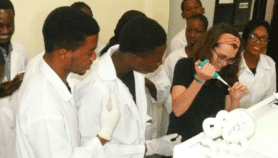Send to a friend
The details you provide on this page will not be used to send unsolicited email, and will not be sold to a 3rd party. See privacy policy.
[NAIROBI] Eleven research projects aiming to boost the cognitive potential of children in the developing world have been funded by the Canadian government for the next two years.
The projects in Africa, Asia and Latin America have together been funded with CAD 11.8 million Canadian dollars (around US$12 million) from Grand Challenges Canada’s ‘Saving Brains’ initiative. The funding was announced last month (13 September).
Peter Singer, chief executive of Grand Challenges Canada, told SciDev.Net that the initiative focused on children because they are the foundation of the development of a country.
"An opportunity to develop brain development is an opportunity to develop a child and a developed child will maximise his/her potential for a country’s development," said Singer.
"The projects are investing in improving children’s conditions in the first 1,000 days of their lives so they can flourish and pull themselves — and consequently their countries — out of poverty."
A number of risk factors are believed to contribute to inadequate brain development in children. They include malnutrition, infections such as malaria, unhealthy pregnancy and birth complications, as well as lack of stimulation and nurturing in early life.
In Africa, a project supported by Laureen Harpe, honorary chair of the ‘Saving Brains’ initiative and wife of the Canadian prime minister, will enable scientists from Makerere University in Uganda and Centre Muraz in Burkina Faso to assess whether using peer counselling to promote exclusive breastfeeding improves the cognitive function and the mental and general health of children once they reach age 5–7.
Karlee Silver, Grand Challenges Canada’s programme officer for women’s and children’s health said the program that encourages exclusive breastfeeding ran from 2006 to 2008 and the children whose mothers participated in that program are now being assessed to determine the impact on their cognitive development.
Another project assessing ‘kangaroo mother care’ will be administered in Colombia. The technique encourages near-constant skin-to-skin contact between mothers and premature babies to improve brain development.
A project in Pakistan will research the effect of interventions to alleviate depression in pregnant women and mothers. It will look at how improvements in interaction between mothers and children impact their development up to the age of 12 years.
Silver said: "These innovations are bold ideas that will have a big impact on cognitive growth in developing world children."
She added that the funding will ensure that researchers can assess the long-term potential of these interventions.
Elizabeth Kruger-Scheltema, an educational psychologist and speech therapist at Kenya’s Kenyatta National Hospital, said there’s a need for long-term solutions to address the cognitive development of young children.
"These studies are very important as it will come with long-term solutions," she concluded.













